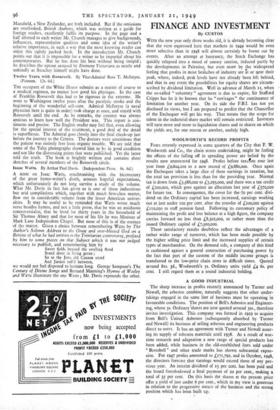FINANCE AND INVESTMENT
By CUSTOS
WITH the new year only three weeks old, it is already becoming clear that the view expressed here that markets in 1949 would be even more selective than in 1948 will almost certainly be borne out by events. After an attempt at buoyancy, the Stock Exchange has quickly relapsed into a mood of uneasy caution, induced partly by the developments in Palestine, but even more by the widespread feeling that profits in most branches of industry are at or near their peak, where, indeed, peak levels have not already been left behind, and that in any event the possibilities for equity shares are circum- scribed by dividend limitation. Well in advance of March it, when the so-called " voluntary " agreement is due to expire, Sir Stafford Cripps has let it be known that he " envisages " the continuance of limitation for another year. On its side the F.B.I. has not yet disclosed its views, but I am prepared to predict that the Chancellor of the Exchequer will get his way. That means that the scope for talent in the industrial share market will remain restricted. Investors will turn more and more to liquidation shares and to shares on which the yields are, for one reason or another, unduly high.
• WOOLWORTH'S RECORD PROFITS
Fears recently expressed in some quarters of the City that F. W. Woolworth and Co., the chain stores undertaking, might be feeling the effects of the falling off in spending power are belied by the results now announced for 1948. Profits before iaxaton rose last year from L9,604,000 to a new record of £9,880,000. Once again the Exchequer takes a large slice of these earnings in taxation, but the total tax provision is less than for the preceding year. Normal tax is down from L5,586,000 to £5,293,000, and there was a tax credit of £200,000, which goes against an allocation last year of £570,000 for future tax. In consequence, the cover for thes7o per cent. divi- dend on the Ordinary capital has been increased, earnings working out at just under too per cent. after the transfer of £200,000 against LI ro,000 to staff pension fund. Following its customary policy of maintaining the profit and loss balance at a high figure, the company carries forward no less than £8,3o2,000, or rather more than the issued Ordinary capital of £7,500,000.
These satisfactory results doubtless reflect the adv.antages of a rather wider range of turnover, which has been made possible by the higher selling price limit and the increased supplies of certain types of merchandise. On the demand side, a company of this kind is cushioned against a general contraction of purchasing power by the fact that part of the custom of the middle income groups is transferred to the low-price chain store in difficult times. Quoted around 8is. 3d., Woolworth's 5s. Ordinary units yield £4 6s. per cent. I still regard them as a sound industrial holding.
A GOOD INDUSTRIAL
The sharp increase in profits recently announced by Turner and Newall, the asbestos combine, naturally suggests that other under- takings engaged in the same line of business must • be operating in favourable conditions. The position of Bell's Asbestos and Engineer- ing, whose 5s. Ordinary 'shares are now quoted around 3os., therefore invites investigation. This company was formed in 1929 to acquire from Bell's United Asbestos (subsequently absorbed by Turner and Newall) its business of selling asbestos and engineering products direct to users. It has an agreement with Turner and Newall assur- ing its supply of asbestos materials until 1958. As a result of war- time research and adaptation a new range of special products has been added, while business in the old-established lines sold under " Bestobell " and other trade marks has shown substantial expan- sion. For 1947 profits amounted to £171,792, and in October, 1948, the directors forecast that earnings would exceed those of any pre- vious year. An interim dividend of 15 per cent. has been paid and the board foreshadowed a final payment of 20 per cent., making a total of 35 per cent. On this basis the shares at the present price offer a yield of just under 6 per cent., which in my view is generous in relation to the progressive nature of the business and the strong
position which has been built up. .






































 Previous page
Previous page